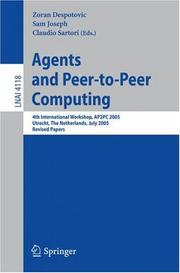| Listing 1 - 3 of 3 |
Sort by
|
Digital
ISBN: 9783540689676 Year: 2006 Publisher: Berlin Heidelberg Springer-Verlag GmbH
Abstract | Keywords | Export | Availability | Bookmark
 Loading...
Loading...Choose an application
- Reference Manager
- EndNote
- RefWorks (Direct export to RefWorks)
Computer architecture. Operating systems --- Information systems --- Artificial intelligence. Robotics. Simulation. Graphics --- Computer. Automation --- ICT (informatie- en communicatietechnieken) --- IR (information retrieval) --- informatica --- maatschappij --- informatiesystemen --- KI (kunstmatige intelligentie) --- computernetwerken --- robots

ISBN: 9783540490258 3540490256 3540689672 Year: 2006 Publisher: Berlin, Heidelberg : Springer Berlin Heidelberg : Imprint: Springer,
Abstract | Keywords | Export | Availability | Bookmark
 Loading...
Loading...Choose an application
- Reference Manager
- EndNote
- RefWorks (Direct export to RefWorks)
Peer-to-peer architecture (Computer networks) --- Intelligent agents (Computer software) --- P2P (Réseaux d'ordinateurs) --- Agents intelligents (Logiciels) --- Congresses. --- Congrès --- Computer Science --- Telecommunications --- Mechanical Engineering - General --- Engineering & Applied Sciences --- Electrical & Computer Engineering --- Mechanical Engineering --- Information Technology --- Artificial Intelligence --- Computer science. --- Computer communication systems. --- Information storage and retrieval. --- Artificial intelligence. --- Computers and civilization. --- Computer Science. --- Computer Communication Networks. --- Artificial Intelligence (incl. Robotics). --- Information Systems Applications (incl. Internet). --- Information Storage and Retrieval. --- Computers and Society. --- Civilization and computers --- Civilization --- AI (Artificial intelligence) --- Artificial thinking --- Electronic brains --- Intellectronics --- Intelligence, Artificial --- Intelligent machines --- Machine intelligence --- Thinking, Artificial --- Bionics --- Cognitive science --- Digital computer simulation --- Electronic data processing --- Logic machines --- Machine theory --- Self-organizing systems --- Simulation methods --- Fifth generation computers --- Neural computers --- Communication systems, Computer --- Computer communication systems --- Data networks, Computer --- ECNs (Electronic communication networks) --- Electronic communication networks --- Networks, Computer --- Teleprocessing networks --- Data transmission systems --- Digital communications --- Electronic systems --- Information networks --- Telecommunication --- Cyberinfrastructure --- Network computers --- Informatics --- Science --- Distributed processing --- Information storage and retrieva. --- Artificial Intelligence. --- Information storage and retrieval systems. --- Automatic data storage --- Automatic information retrieval --- Automation in documentation --- Computer-based information systems --- Data processing systems --- Data storage and retrieval systems --- Discovery systems, Information --- Information discovery systems --- Information processing systems --- Information retrieval systems --- Machine data storage and retrieval --- Mechanized information storage and retrieval systems --- Computer systems --- Electronic information resources --- Data libraries --- Digital libraries --- Information organization --- Information retrieval --- Application software. --- Application computer programs --- Application computer software --- Applications software --- Apps (Computer software) --- Computer software
Book
ISBN: 9783540689676 Year: 2006 Publisher: Berlin Heidelberg Springer Berlin Heidelberg
Abstract | Keywords | Export | Availability | Bookmark
 Loading...
Loading...Choose an application
- Reference Manager
- EndNote
- RefWorks (Direct export to RefWorks)
Peer-to-peer(P2P)computing has attracted enormous media attention, initially spurred by the popularity of ?le sharing systems such as Napster, Gnutella, and Morpheus. Morerecently,systemslikeBitTorrentandeDonkeyhavecontinuedto sustain that attention. New techniques such as distributed hash-tables (DHTs), semantic routing, and Plaxton Meshes are being combined with traditional c- cepts such as Hypercubes, Trust Metrics and caching techniques to pool - gether the untapped computing power at the edges of the Internet. These new techniques and possibilities have generated a lot of interest in many industrial organizations, and has resulted in the creation of a P2P working group on st- dardizationin this area (http://www. irtf. org/charter?gtype=rg&group=p2prg). In P2P computing, peers and services forego central coordination and - namically organize themselves to support knowledge sharing and collaboration, in both cooperative and non-cooperative environments. The success of P2P s- tems strongly depends on a number of factors. First, the ability to ensure eq- table distribution of content and services. Economic and business models which rely on incentive mechanisms to supply contributions to the system are being developed, along with methods for controlling the free riding issue. Second, the ability to enforce provision of trusted services. Reputation-based P2P trust management models are becoming a focus of the research community as a - able solution. The trust models must balance both constraints imposed by the environment (e. g. , scalability) and the unique properties of trust as a social and psychological phenomenon.
Computer architecture. Operating systems --- Information systems --- Artificial intelligence. Robotics. Simulation. Graphics --- Computer. Automation --- ICT (informatie- en communicatietechnieken) --- IR (information retrieval) --- informatica --- maatschappij --- informatiesystemen --- KI (kunstmatige intelligentie) --- computernetwerken --- robots
| Listing 1 - 3 of 3 |
Sort by
|

 Search
Search Feedback
Feedback About
About Help
Help News
News